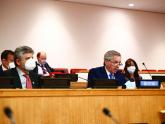On June 24th, the United Nations Special Committee on Decolonization (C-24) adopted by consensus a new resolution that reiterates, as every year since 1983, the call to the United Kingdom and Argentina to resume negotiations to find, as soon as possible, a peaceful and definitive solution to the sovereignty controversy over the Malvinas, South Georgias and South Sandwich Islands and the surrounding maritime areas, while reiterating its firm support of the good offices mission of the UN Secretary-General, António Guterres.
“The Argentine government permanently maintains the same will to continue sovereignty negotiations with the United Kingdom. However, for almost four decades the United Kingdom has refused to resume negotiations with Argentina to find a peaceful solution to the bilateral sovereignty dispute in accordance with the provisions of the General Assembly”, said Argentine Foreign Minister Felipe Solá during his extensive speech at the plenary session of the Committee and on his first visit to the United Nations.
Accompanied by his Chief of Staff, Guillermo Justo Chaves, the Secretary for Malvinas, Antarctica and the South Atlantic, Daniel Filmus, and the Argentine Permanent Representative to the United Nations, María del Carmen Squeff, Solá emphasized that “the United Kingdom alleges that there will be no sovereignty negotiations unless the inhabitants of the Islands consent to them. In this way, it intends to ignore what is established by the General Assembly, based on the supposed right to self-determination of the inhabitants of the Malvinas Islands. This reasoning has no basis in international law and is nothing more than an excuse to preserve its colonial presence in the South Atlantic. "
Solá highlighted that “neither resolution 2065 nor any of the subsequent ones mention the principle of self-determination of peoples. Our country has consistently demonstrated its respect for the interests of the Malvinas Islands’ inhabitants. Respect for the islanders' way of life is enshrined in our National Constitution. In this same spirit, the Argentine government has arranged and allowed flights from the Islands to other countries on the continent and has proposed to the United Kingdom the reestablishment of a regular weekly flight from mainland Argentina to the Malvinas Islands. It continues to await a response in this regard. "
After the intervention of the Argentine petitioners, Paula Vernet and Guillermo Clifton, descendants of the first Argentines who inhabited the islands, the Foreign Minister explained: “In March 2020, when the world was shaken by the worst pandemic of the last hundred years, Argentina conveyed to the Government of the United Kingdom its willingness to collaborate with the inhabitants of the Islands by offering food, medical supplies or diagnostic tests for COVID-19, as well as humanitarian flights and access to medical treatment on the continent. The Argentine government’s offer was never answered ”.
Solá forcefully stated that “the United Kingdom persists in activities contrary to General Assembly resolution 31/49, which urges the parties to refrain from carrying out unilateral actions in the disputed area until a definitive solution is found to the controversy. This year we learned that the United Kingdom decided to extend the unilateral fishing licenses in the waters surrounding the Malvinas for a further 25 years from 2031, which makes a cooperation scheme on the conservation of fishery resources impossible to maintain. The Argentine Government will continue to reject the United Kingdom’s illegal exploitation of natural resources that belong to the Argentine people”.
Also in contradiction with Resolution 31/49, the United Kingdom maintains an unjustified and disproportionate military presence on the Islands, regularly carrying out maneuvers and exercises that Argentina has vigorously protested. The deployment of the British military force on the Islands is completely unjustified, since all the democratic governments of Argentina have reaffirmed their decision to resolve the controversy exclusively by peaceful means”, he added, and conveyed the unanimous support of all the country’s political forces to the peaceful recovery of the effective exercise of sovereignty over the Malvinas, South Georgias and South Sandwich Islands and the surrounding maritime spaces
In historical terms, he pointed out that “the evidence that Argentina exercised sovereignty over the Islands at the time of the British usurpation is abundant and conclusive and goes back to the first moments of its life as an independent nation. The British forceful usurpation of a part of Argentine territory and the expulsion of the legitimately established Argentine population and authorities was never consented to by our country. Argentina has permanently and uninterruptedly protested this usurpation from the moment it took place, both bilaterally to the United Kingdom and in all relevant international forums ”.
Towards the end of his speech, the head of Argentine diplomacy especially thanked the Latin American countries that co-sponsored the resolution: Chile, that also presented it, Bolivia, Cuba, Ecuador, Nicaragua, Venezuela. He also thanked all the countries that spoke during the session and those that have added their voice in multiple regional and multilateral forums to the international community’s call to resolve this controversy, such as OAS, the G77 plus China, MERCOSUR, the Ibero-American Summit, CELAC, SICA, OLADE, PARLASUR, PARLACEN, the Africa-South America Summit (ASA) and the Summit of South American - Arab Countries (ASPA).
The Special Committee on Decolonization, created in 1961 as a subsidiary body of the United Nations General Assembly, is mandated to ensure the application of resolution 1514 (XV) of the United Nations General Assembly. Within this framework, it annually examines the situations that are still pending decolonization and adopts resolutions that allow progress towards the end of colonialism.


